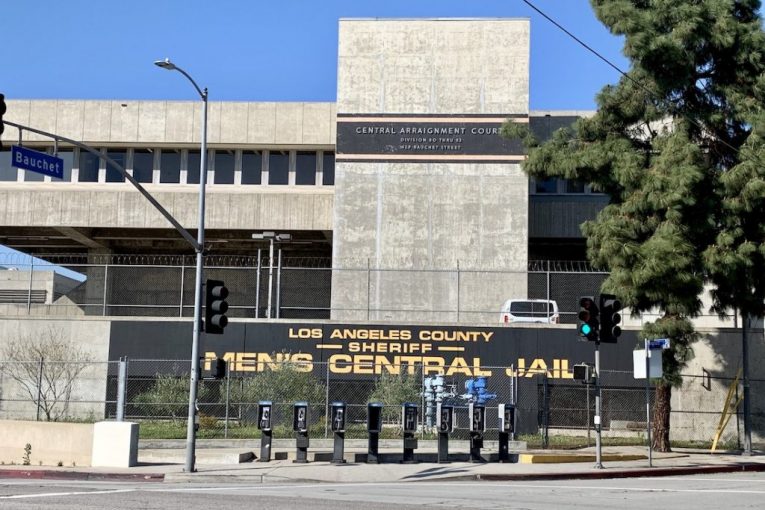

By Anisha Girotra
LOS ANGELES — On the evening of March 29, coalition leaders and community members held a press conference and rally to demand the closure of Men’s Central Jail, advocate for the full funding of Measure J, and honor the lives of those harmed by law enforcement violence and incarceration.
A press release issued on March 28 stated that in July of 2020 the LA County Board of Supervisors needed a plan to close Men’s Central Jail (MCJ), Los Angeles’s largest and oldest jail, within one year. However, within the past year, the conditions of this jail have gotten worse as the county took a passive approach to minimize COVID-19 infections and increased its inmate population.
Gabriela Vasquez of La Defensa, a project of Tides Advocacy that is leading a movement to decarcerate the largest jail population in the US within the LA County jail system, characterized MCJ as “an unsafe, overcrowded, crumbling structure that stands as a landmark to the harms of the carceral system.”
To honor voices of the Black, Brown, and Indigenous communities and the lives of those impacted by police brutality and incarceration and to raise awareness of the demands to close MCJ, a rally and candlelight vigil was held outside Men’s Central Jail with statements made by community leaders and impacted families.
A press release issued on March 30 cited Eunisses Hernandez’s, co-founder and executive director of La Defensa, and gave an explanation of how the Board of Supervisors has not helped these communities despite the need for the closure of this jail. According to Hernandez, although communities and coalitions have spent years creating recommendations, reports, and plans to close MCJ and fund alternatives to incarceration, the Board of Supervisors have said they need new data and reports to close the jail.
“We don’t need another report to collect dust on the shelf. What we need is the political will from the LA County Board of Supervisors to close MCJ and fully fund Measure J,” said Hernandez.
Measure J was passed in November 2020 with over 2.1 million voters due to the help of Black-led organizations such as Black Lives Matter LA. This measure permanently changed the County Charter to require at least 10% of the Net County Cost (NCC) to be invested into alternatives to incarceration as well as directly to Black, low-income, and POC communities.
During the past five weeks, community members have participated in a subcommittee to develop funding recommendations for Measure J, which included a recommendation from the Health, Behavioral Health, and Diversion subcommittee to direct at least $200 million in 2021 to the closing of Men’s Central Jail.
Although this recommendation passed, LA County’s CEO Fesia Davenport released a statement that set aside only $100 million for Measure J’s funding in the 2021-22 county budget with a total of $300 million that would be set aside by 2024. Furthermore, Davenport’s memo set aside less than a third of the 10% minimum of the NCC towards alternatives to incarceration.
Organizers of this event advocated for the full funding of Measure J along with the community recommendations to close Men’s Central Jail by allocating $200 million in the 2021-22 county budget to “immediately expand a mix of housing and services beds for at least 3,600 justice-involved people and the communities most disproportionately impacted by incarceration, poverty, COVID-19, and other low social determinants of health,”
To demonstrate their support for the full funding of Measure J and its implementation, prior to the candlelight vigil, coalition and community members gathered for a press conference at the Kenneth Hahn Hall of Administration accompanied by an art installation of flowers and jail beds to protest the harms that incarceration has on BIPOC, low-income, LGBQ+, and TGI communities.
At the press conference, Melina Abdullah, co-founder of Black Lives Matter Los Angeles, expressed that Measure J needs to be fully funded and MCJ needs to be closed as the people voted into office need to take action to fulfill the demands of the voters.
Describing the opinions of voters and the community, Abdullah stated, “What actual safety means is putting our resources into mental health care, into housing, into good jobs, into recreational and educational programs for our children…That’s where we want our tax dollars to go. We don’t want them to go into these warehouses that traumatize and steal the lives of our community members.”
Mark-Anthony Clayton-Johnson, founder and executive director of Frontline Wellness Network and a leader in the Reimagine LA and Justice LA coalitions, conveyed the need for funding Measure J and described how much money is wasted by incarceration and the Sheriff’s Department every year.
Clayton-Johnson revealed that LA county spends $46 million a year arresting Black homeless people often for public health-related charges and that lawsuits against the Sheriff’s Department regarding brutality, corruption, and violation of people’s rights last year cost LA county $84 million.
Clayton-Johnson asserted that the community’s money should instead be allocated to “care, housing, and dignity for Black people.”
Anisha Girotra is a writer for the LA Vanguard’s social justice desk. She is a biochemistry major at UCLA, originally from Scottsdale, AZ.
To sign up for our new newsletter – Everyday Injustice – https://tinyurl.com/yyultcf9
Support our work – to become a sustaining at $5 – $10- $25 per month hit the link: